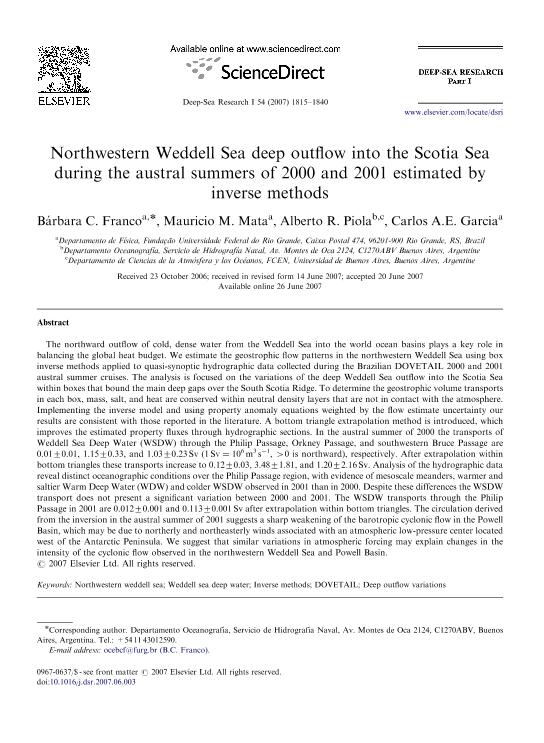Mostrar el registro sencillo del ítem
dc.contributor.author
Franco, Barbara Cristie

dc.contributor.author
Mata, Mauricio M.
dc.contributor.author
Piola, Alberto Ricardo

dc.contributor.author
Garcia, Carlos Alberto

dc.date.available
2017-12-04T14:50:21Z
dc.date.issued
2007-10
dc.identifier.citation
Franco, Barbara Cristie; Mata, Mauricio M.; Piola, Alberto Ricardo; Garcia, Carlos Alberto; Northwestern Weddell Sea deep outflow into the Scotia Sea during the austral summers of 2000 and 2001 estimated by inverse methods; Elsevier; Deep Sea Research Part I: Oceanographic Research Papers; 54; 10; 10-2007; 1815-1840
dc.identifier.issn
0967-0637
dc.identifier.uri
http://hdl.handle.net/11336/29538
dc.description.abstract
The northward outflow of cold, dense water from the Weddell Sea into the world ocean basins plays a key role in balancing the global heat budget. We estimate the geostrophic flow patterns in the northwestern Weddell Sea using box inverse methods applied to quasi-synoptic hydrographic data collected during the Brazilian DOVETAIL 2000 and 2001 austral summer cruises. The analysis is focused on the variations of the deep Weddell Sea outflow into the Scotia Sea within boxes that bound the main deep gaps over the South Scotia Ridge. To determine the geostrophic volume transports in each box, mass, salt, and heat are conserved within neutral density layers that are not in contact with the atmosphere. Implementing the inverse model and using property anomaly equations weighted by the flow estimate uncertainty our results are consistent with those reported in the literature. A bottom triangle extrapolation method is introduced, which improves the estimated property fluxes through hydrographic sections. In the austral summer of 2000 the transports of Weddell Sea Deep Water (WSDW) through the Philip Passage, Orkney Passage, and southwestern Bruce Passage are 0.01 7 0.01, 1.15 7 0.33, and 1.03 7 0.23 Sv (1 Sv ¼ 10 6 m 3 s 1 , 4 0 is northward), respectively. After extrapolation within bottom triangles these transports increase to 0.12 7 0.03, 3.48 7 1.81, and 1.20 7 2.16 Sv. Analysis of the hydrographic data reveal distinct oceanographic conditions over the Philip Passage region, with evidence of mesoscale meanders, warmer and saltier Warm Deep Water (WDW) and colder WSDW observed in 2001 than in 2000. Despite these differences the WSDW transport does not present a significant variation between 2000 and 2001. The WSDW transports through the Philip Passage in 2001 are 0.012 7 0.001 and 0.113 7 0.001 Sv after extrapolation within bottom triangles. The circulation derived from the inversion in the austral summer of 2001 suggests a sharp weakening of the barotropic cyclonic flow in the Powell Basin, which may be due to northerly and northeasterly winds associated with an atmospheric low-pressure center located west of the Antarctic Peninsula. We suggest that similar variations in atmospheric forcing may explain changes in the intensity of the cyclonic flow observed in the northwestern Weddell Sea and Powell Basin.
dc.format
application/pdf
dc.language.iso
eng
dc.publisher
Elsevier

dc.rights
info:eu-repo/semantics/openAccess
dc.rights.uri
https://creativecommons.org/licenses/by-nc-sa/2.5/ar/
dc.subject
Northwestern Weddell Sea
dc.subject
Inverse Methods
dc.subject
Weddell Sea Deep Water
dc.subject
Scotia Sea
dc.subject.classification
Meteorología y Ciencias Atmosféricas

dc.subject.classification
Ciencias de la Tierra y relacionadas con el Medio Ambiente

dc.subject.classification
CIENCIAS NATURALES Y EXACTAS

dc.title
Northwestern Weddell Sea deep outflow into the Scotia Sea during the austral summers of 2000 and 2001 estimated by inverse methods
dc.type
info:eu-repo/semantics/article
dc.type
info:ar-repo/semantics/artículo
dc.type
info:eu-repo/semantics/publishedVersion
dc.date.updated
2017-11-21T13:57:21Z
dc.journal.volume
54
dc.journal.number
10
dc.journal.pagination
1815-1840
dc.journal.pais
Países Bajos

dc.journal.ciudad
Amsterdam
dc.description.fil
Fil: Franco, Barbara Cristie. Universidade Federal do Rio Grande do Sul; Brasil
dc.description.fil
Fil: Mata, Mauricio M.. Universidade Federal do Rio Grande do Sul; Brasil
dc.description.fil
Fil: Piola, Alberto Ricardo. Universidad de Buenos Aires; Argentina. Ministerio de Defensa. Armada Argentina. Servicio de Hidrografía Naval; Argentina. Consejo Nacional de Investigaciones Científicas y Técnicas; Argentina
dc.description.fil
Fil: Garcia, Carlos Alberto. Universidade Federal do Rio Grande do Sul; Brasil
dc.journal.title
Deep Sea Research Part I: Oceanographic Research Papers

dc.relation.alternativeid
info:eu-repo/semantics/altIdentifier/doi/http://dx.doi.org/10.1016/j.dsr.2007.06.003
dc.relation.alternativeid
info:eu-repo/semantics/altIdentifier/url/https://www.sciencedirect.com/science/article/pii/S0967063707001550
Archivos asociados
